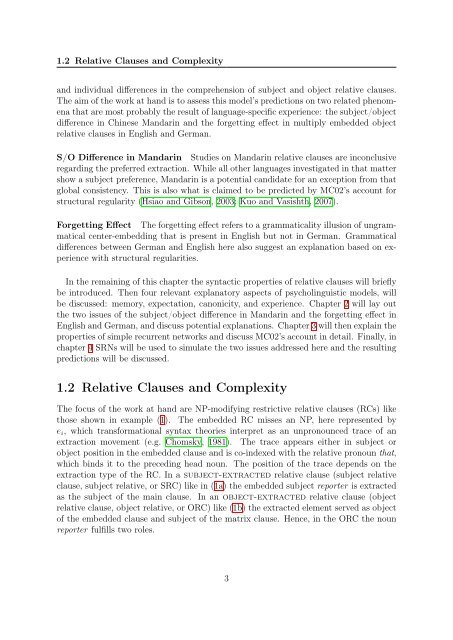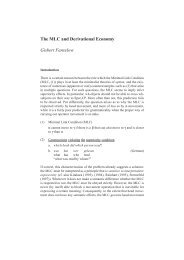Connectionist Modeling of Experience-based Effects in Sentence ...
Connectionist Modeling of Experience-based Effects in Sentence ...
Connectionist Modeling of Experience-based Effects in Sentence ...
You also want an ePaper? Increase the reach of your titles
YUMPU automatically turns print PDFs into web optimized ePapers that Google loves.
1.2 Relative Clauses and Complexity<br />
and <strong>in</strong>dividual differences <strong>in</strong> the comprehension <strong>of</strong> subject and object relative clauses.<br />
The aim <strong>of</strong> the work at hand is to assess this model’s predictions on two related phenomena<br />
that are most probably the result <strong>of</strong> language-specific experience: the subject/object<br />
difference <strong>in</strong> Ch<strong>in</strong>ese Mandar<strong>in</strong> and the forgett<strong>in</strong>g effect <strong>in</strong> multiply embedded object<br />
relative clauses <strong>in</strong> English and German.<br />
S/O Difference <strong>in</strong> Mandar<strong>in</strong> Studies on Mandar<strong>in</strong> relative clauses are <strong>in</strong>conclusive<br />
regard<strong>in</strong>g the preferred extraction. While all other languages <strong>in</strong>vestigated <strong>in</strong> that matter<br />
show a subject preference, Mandar<strong>in</strong> is a potential candidate for an exception from that<br />
global consistency. This is also what is claimed to be predicted by MC02’s account for<br />
structural regularity (Hsiao and Gibson, 2003; Kuo and Vasishth, 2007).<br />
Forgett<strong>in</strong>g Effect The forgett<strong>in</strong>g effect refers to a grammaticality illusion <strong>of</strong> ungrammatical<br />
center-embedd<strong>in</strong>g that is present <strong>in</strong> English but not <strong>in</strong> German. Grammatical<br />
differences between German and English here also suggest an explanation <strong>based</strong> on experience<br />
with structural regularities.<br />
In the rema<strong>in</strong><strong>in</strong>g <strong>of</strong> this chapter the syntactic properties <strong>of</strong> relative clauses will briefly<br />
be <strong>in</strong>troduced. Then four relevant explanatory aspects <strong>of</strong> psychol<strong>in</strong>guistic models, will<br />
be discussed: memory, expectation, canonicity, and experience. Chapter 2 will lay out<br />
the two issues <strong>of</strong> the subject/object difference <strong>in</strong> Mandar<strong>in</strong> and the forgett<strong>in</strong>g effect <strong>in</strong><br />
English and German, and discuss potential explanations. Chapter 3 will then expla<strong>in</strong> the<br />
properties <strong>of</strong> simple recurrent networks and discuss MC02’s account <strong>in</strong> detail. F<strong>in</strong>ally, <strong>in</strong><br />
chapter 4 SRNs will be used to simulate the two issues addressed here and the result<strong>in</strong>g<br />
predictions will be discussed.<br />
1.2 Relative Clauses and Complexity<br />
The focus <strong>of</strong> the work at hand are NP-modify<strong>in</strong>g restrictive relative clauses (RCs) like<br />
those shown <strong>in</strong> example (1). The embedded RC misses an NP, here represented by<br />
ei, which transformational syntax theories <strong>in</strong>terpret as an unpronounced trace <strong>of</strong> an<br />
extraction movement (e.g. Chomsky, 1981). The trace appears either <strong>in</strong> subject or<br />
object position <strong>in</strong> the embedded clause and is co-<strong>in</strong>dexed with the relative pronoun that,<br />
which b<strong>in</strong>ds it to the preced<strong>in</strong>g head noun. The position <strong>of</strong> the trace depends on the<br />
extraction type <strong>of</strong> the RC. In a subject-extracted relative clause (subject relative<br />
clause, subject relative, or SRC) like <strong>in</strong> (1a) the embedded subject reporter is extracted<br />
as the subject <strong>of</strong> the ma<strong>in</strong> clause. In an object-extracted relative clause (object<br />
relative clause, object relative, or ORC) like (1b) the extracted element served as object<br />
<strong>of</strong> the embedded clause and subject <strong>of</strong> the matrix clause. Hence, <strong>in</strong> the ORC the noun<br />
reporter fulfills two roles.<br />
3
















